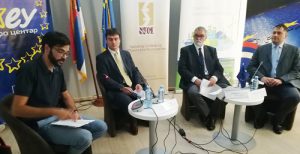Sharing gets you further
On Tuesday, September 19th, a “Sharing gets you further” conference was organized, in the context of celebration of the EU Mobility Week 2017, and within the framework of the “Climate Smart Urban Development Challenge” (CSUD) project, implemented by the Ministry of Environmental protection, with UNDP support.
At the premises of the EU Info Center in Belgrade, representatives of the Delegation of the European Union to the Republic of Serbia, the Standing Conference of Cities and Municipalities, and UNDP emphasized the importance of development and implementation of measures that reduce the negative effects of transport on health and the environment, especially in the urban areas. Participants agreed that even though the transport sector is one of the significant contributors to the greenhouse gas (GHG) and other harmful substance emissions, it also has significant potential for environmental protection and the fight against climate change, as well as for the improvement of human health, and for the economic development of local communities through the opening of new jobs and attracting investment.
In this regard, the participants emphasized the necessity to introduce and further spread alternative, non-motorized methods of transportation, specifying, in particular, cycling as a very simple and all-available way of transport. At the same time, the need for adequate traffic planning was emphasized, including the construction of infrastructure adapted to the needs of cyclists and pedestrians, along with the raising awareness of all traffic participants, and the development of adequate safety and security policies. At the conference, representatives of Belgrade, Novi Sad and Krusevac presented the best practice examples from their cities, while the founders of the start-up “Ono bikes” and CarGo mobile app spoke about the application of technological innovations in urban mobility.
It was concluded that the development of sustainable and climate-resistant cities and municipalities requires a multi-sectoral approach, and that the development of sustainable transport is a good example, since transport improves the quality of life, enables economic growth and development, and, on the other hand, has significant potential for protecting the environment and human health.
From the perspective of the “Climate Smart Urban Development Challenge” project, conference participants and the public were invited to take part in a unique “challenge”, and use any alternative mode of transport on September 22, when going to and from the workplace, other than individual vehicles. In this way, they will be able to personally contribute to the development of a sustainable and healthier local community, and climate change resilient at the same time.


